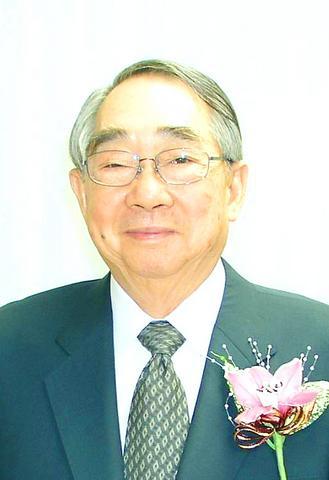Taiwan's leading shipping tycoon, who endorsed President Chen Shui-bian's (
Yesterday's statement by Evergreen Group Chairman Chang Yung-fa (

PHOTO: LIU LI-JEN, TAIPEI TIMES
Chang stopped short of naming his preferred candidate, but left little room for doubt when he called on voters to support the candidate who promised better ties with arch-foe China.
The main issue dividing the contenders is their policy towards China, with incumbent Chen espousing a policy that sees Taiwan as independent while Nationalist Party leader Lien Chan (
"Which presidential candidate can bring us a life of peace, stability, prosperity, and well-being? The answer should be fairly clear," Chang said in a statement.
"The ideal candidate must ... be able to build a peaceful, stable and harmonious cross-Strait relationship in order to lead us to re-create Taiwan's economic miracle," Chang said.
Chang was a member of an advisory panel to Chen led by Nobel laureate Lee Yuan-tseh (
In an eleventh-hour show of support, Lee, the 1986 Nobel winner in chemistry, backed Chen for the second time in a row but tempered his move with reservations about Chen's first term.
Chang said he had met Wang Yung-ching (
Chang, who has set his sights on the vast China market, turned down an offer to be a senior adviser to Chen in 2002.
Businessmen such as tycoons Chang and Wang have been clamoring for the lifting of a decades-old ban on direct sea and air links with the China to save time and reduce costs.
Despite testy political ties, Taiwan investors have poured more than US$100 billion into China since detente first began in the late 1980s, lured by low land and labor costs as well as a common language and culture.
The Evergreen Group consists of Evergreen Marine, the world's third largest shipping line, EVA Airways and Uniglory Marine. It has set up offices in a dozen Chinese cities and invested heavily in joint ventures in China.

The first global hotel Keys Selection by the Michelin Guide includes four hotels in Taiwan, Michelin announced yesterday. All four received the “Michelin One Key,” indicating guests are to experience a “very special stay” at any of the locations as the establishments are “a true gem with personality. Service always goes the extra mile, and the hotel provides much more than others in its price range.” Of the four hotels, three are located in Taipei and one in Taichung. In Taipei, the One Key accolades were awarded to the Capella Taipei, Kimpton Da An Taipei and Mandarin Oriental Taipei. Capella Taipei was described by

EVA Airways today confirmed the death of a flight attendant on Saturday upon their return to Taiwan and said an internal investigation has been launched, as criticism mounted over a social media post accusing the airline of failing to offer sufficient employee protections. According to the post, the flight attendant complained of feeling sick on board a flight, but was unable to take sick leave or access medical care. The crew member allegedly did not receive assistance from the chief purser, who failed to heed their requests for medical attention or call an ambulance once the flight landed, the post said. As sick

The Taichung District Court yesterday confirmed its final ruling that the marriage between teenage heir Lai (賴) and a man surnamed Hsia (夏) was legally invalid, preventing Hsia from inheriting Lai’s NT$500 million (US$16.37 million) estate. The court confirmed that Hsia chose not to appeal the civil judgement after the court handed down its ruling in June, making the decision final. In the June ruling, the court said that Lai, 18, and Hsia, 26, showed “no mutual admiration before the marriage” and that their interactions were “distant and unfamiliar.” The judge concluded that the couple lacked the “true intention of

INDUSTRY: Beijing’s latest export measures go beyond targeting the US and would likely affect any country that uses Chinese rare earths or related tech, an academic said Taiwanese industries could face significant disruption from China’s newly tightened export controls on rare earth elements, as much of Taiwan’s supply indirectly depends on Chinese materials processed in Japan, a local expert said yesterday. Kristy Hsu (徐遵慈), director of the Taiwan ASEAN Studies Center at the Chung-Hua Institution for Economic Research, said that China’s latest export measures go far beyond targeting the US and would likely affect any country that uses Chinese rare earths or related technologies. With Japan and Southeast Asian countries among those expected to be hit, Taiwan could feel the impact through its reliance on Japanese-made semi-finished products and